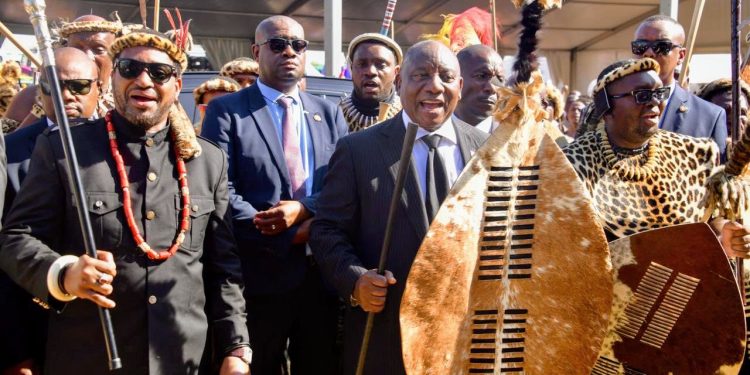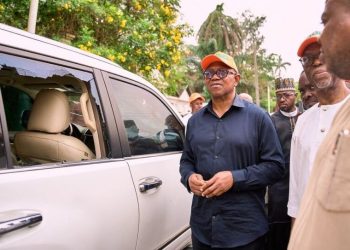The South African people have commemorated 110th memorial life of King Dinuzulu kaCetshwayo who led his people in fighting against the colonial invaders, his fight was a collective struggle for freedom for all the oppressed people of his country.
On Saturday, the commemoration ceremony took place at KwaCeza, a venue of historical significance where King Dinuzulu launched a decisive attack against this colonial forces, emerging victorious in the eastern parts of the town of Nongoma.
The South African President, Cyril Ramaphosa who had earlier at the King Dinuzulu memorial site in Emakhosini, KwaZulu Natal, to pay his respects and lay a wreath in honour of King Dinuzulu on the occasion of his commemoration.
King Dinuzulu kaCetshwayo ruled the Zulu Nation from youthful age during a difficult period when the Zulu Nation was under siege from colonial rule, while effort to divide the Zulu Nation was at its prime, and the colonial support came from the total onslaught of the Zulu Kingdom.
In his remarks at the commemoration ceremony, the President said South Africans pay homage to King Dinuzulu, the Inkosi Yamakhosi, a visionary and a freedom fighter, who despite the yoke of oppression and bondage inflicted on him and his people, never wavered.
According to him, “Since the colonisers first arrived on our soil, our forebearers, the Khoi, the San, the amaXhosa, amaZulu, AbeSotho, Batswana, BaVenda, BaShangane, baDzonga, BaPedi, the Xhu and the Khwe, Ama Swati all took up arms in defence of our sovereignty, in defence of the land, and in defence of our people.
“Long before the founding of the African National Congress in 1912, it was traditional and indigenous leaders at the forefront of the resistance against colonialism. In his commemoration, we also remember heroes like the Khoi leader, Autshumayo, Maqoma.
“And Hintsa from House of Tshiwo, Siqungati and Gecelo from the Aba-Thembu, iSilo uCetshwayo, iNkosi uBhambata kaMancinza balapha KwaZulu, Mampuru, Sekhukhune from Aba-Pedi, Makhado and Tshivhase from Ama-Venda, and many others who were in the forefront of the wars of resistance”.
Speaking on his background, the President said King Dinuzulu was born in 1868, near the present-day town of eMpangeni, to his mother Nomvimbi oKaMsweli of the Mzimela, and his father the then Prince Cetshwayo ka Mpande.
He added, “Your Majesty, nina beSilo, to the short-sighted colonial eye, King Dinuzulu, was born an uneducated rural youth. And yet he was gifted with wisdom beyond our imagination by uMvelinqangi and the ancestors.
“Everything that we aspired to be as a people and a nation was personified in this King. He shepherded his people with wisdom and distinction. Became king at the tender age of 16 years in 1884, following the passing of his father, King Cetshwayo in the same year.
“This level of sacrifice from a life so young would later become the hallmark of our struggle for freedom. Scores of young people, as epitomised by the generation of 1976, took a stand against the oppressive apartheid regime. Others joined the armed struggle”, Ramaphosa said.
Reflecting on the qualities of leadership embodied by the monarch, the President said King Dinuzulu did not fight battles of greed and unchecked power for selfish gain, not ascend to the throne to enrich himself and ignore the plight of his people.
“His wars were all wars for peace and restoration of the dignity of Zulu Kingdom and its people. He supported the Bhambatha Rebellion, led by Bhambatha ka Mancinza in 1906, which earned him another prison sentence.
“King Dinuzulu did not see the struggle for the freedom of the Zulu nation as separate from the struggle for freedom of all South Africans. In his political liberation journey, he embraced all those who were like-minded, and collaborated with players from diverse backgrounds became his signature.
“King Dinuzulu was a non-racialist in his approach to life. Subjected himself to the collective leadership of the time. He led and accepted being led for the benefit of his people”.
The President lamented that now, society is burdened by leaders who refuse to be led. “They use their past and current leadership roles to sow division, fear and hate. They threaten violence and mayhem against the democratic state and its laws.
“Let me be clear, as I have been. This we will not allow. We will follow in the footsteps of King Dinuzulu and forge ahead with unifying our nation. We must and we will resist and defeat the merchants of destruction that are in our midst, just as King Dinuzulu did”, Ramaphosa added.
South African leader said, “On this the 110th anniversary commemoration of one of our greatest forebearers, we must ensure that the story of this son of the African soil is not lost in the annals of history, but continues to be told by generations to come”.
He promised that as government departments, provinces and municipalities, to continue to embrace the cultural heritage and liberation history. “Liberation tourism has a key role to play in developing economy of the province and the country as a whole”.
Ramaphosa called on the private sector to be part of this endeavour aimed at preserving the story of South Africa’s liberation. “It is important that these events and activities be translated into sustainable socio-economic endeavours aimed at job creation in the related sectors.
“It will also be important that our academics and intellectuals engaged in documentation of our history. For us to know where we are going, we have to know where we come from as a people. With foundation laid by fore- bearers such as King Dinuzulu, we overcome poverty, inequality, unemployment and underdevelopment.
“We are mindful that the struggle for liberation was waged by those who were robbed of enjoying their own youth, as was the case with Inkosi uDinuzulu. We shall not fail to make them proud. We shall ensure that their struggle and sacrifice was not in vain. We shall ensure that we leave no-one behind”, he said.
S’Africa marks 110yrs of King Dinuzulu who fought colonial invaders
Please login to join discussion











